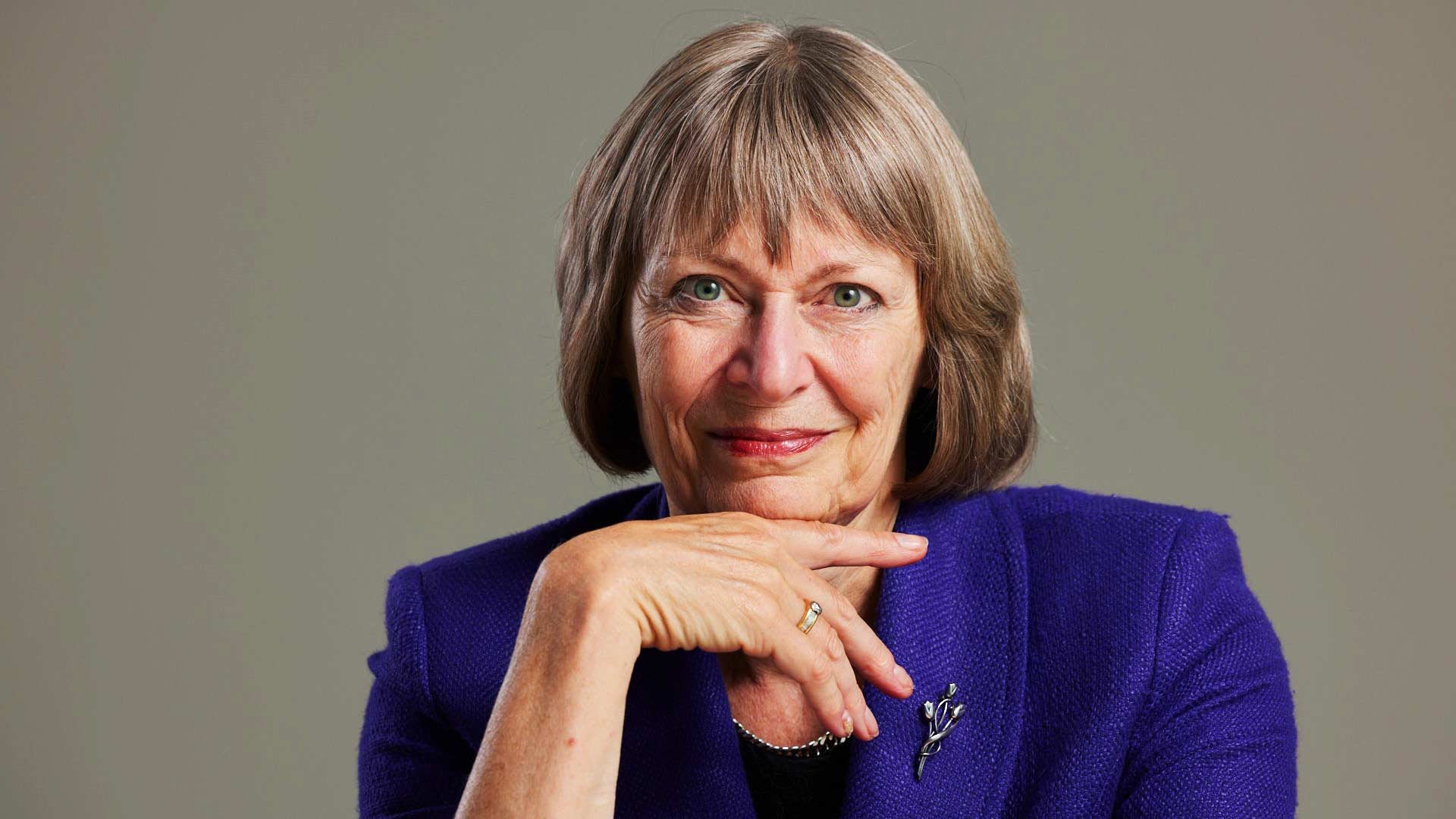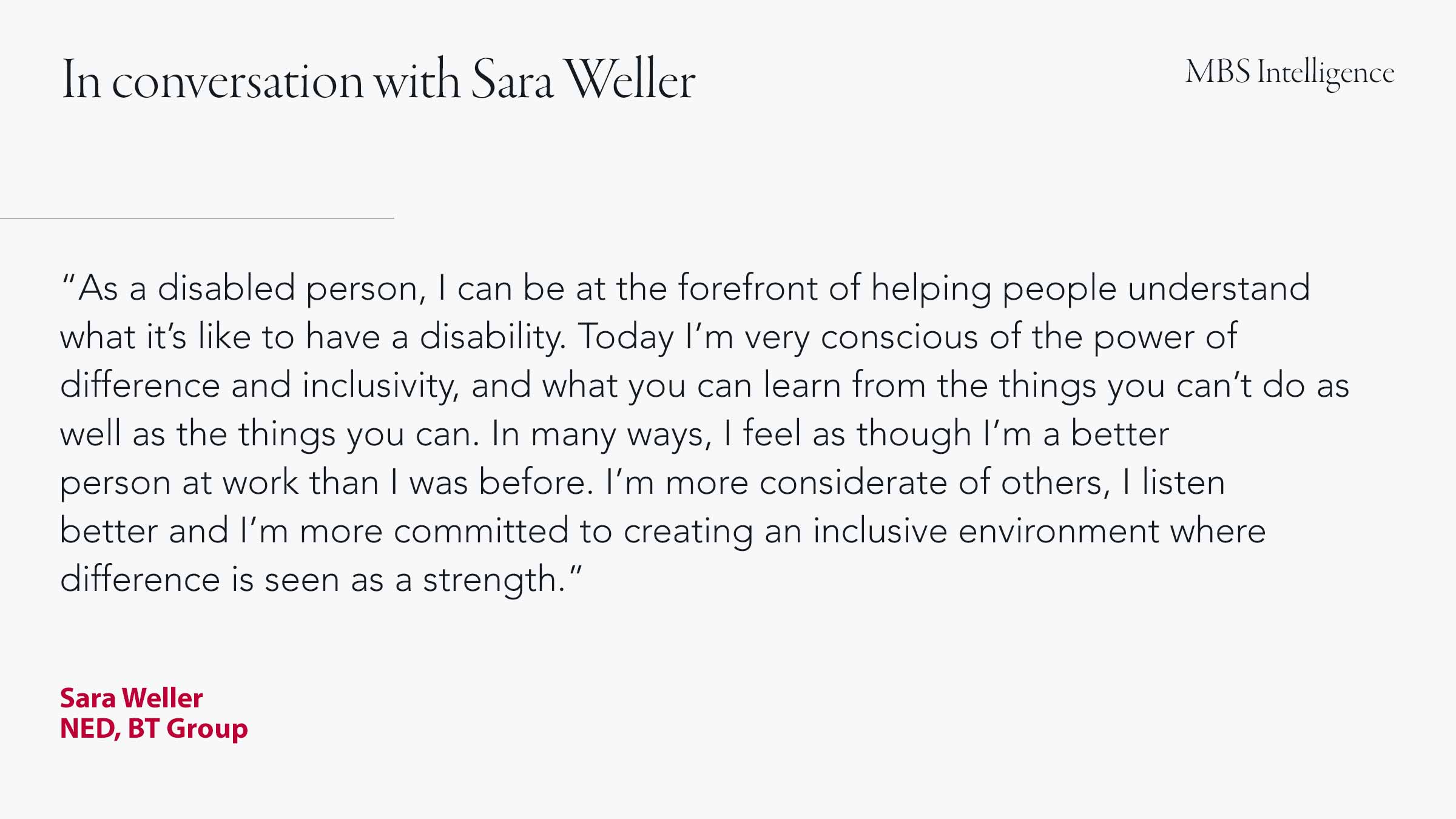Years ago, I was on the team of external advisors tasked with replacing the old guard at Sainsbury’s. I knew Sara Weller, who at the time was Co-Managing Director at Sainsbury’s and had a formidable reputation. But it has only been through my Boards of the Future work and since her NED career that I truly got to know her. And what a waste of all those years… as Sara – who after Sainsbury’s moved to lead Argos and has gone on to a have a varied non-executive career in the public and private sectors – always has something interesting to say and some wisdom to impart.
After one such fascinating conversation last month, I decided to write a column on her for the Weekend Edition. So earlier this week, we met up over Zoom to discuss what it was like being one of the first women in retail, her experience since being diagnosed with MS and what leaders can do to dial-up their focus on disability inclusion.
As with all my Q&As, our discussion started at the very beginning. “I was born into a family of public servants,” Sara told me. “My father was a government scientist, my aunt and uncle were tax inspectors and my other aunt was a headteacher. I went to a comprehensive primary school, then on to grammar school and then eventually Oxford where I read Chemistry for four years.” Remarkably, Sara was part of the first cohort of 30 women to be admitted to New College, Oxford, where she spent her time studying and playing badminton for the university.
“Oxford was the first point at which I noticed anything about inclusion and diversity.”
“Oxford was the first point at which I noticed anything about inclusion and diversity,” Sara reflected. “At home, everyone had been lower middle class like me. But at Oxford, the vast majority of students were public school educated and significantly wealthier than we were. Many of my fellow women were heiresses.”
After a successful milk round (“I applied for 27 jobs, had 26 first interviews, 7 second interviews and a total of 6 job offers”), Sara began her career as a Mars graduate trainee on a scheme that became a training school for many of retail’s most successful leaders. “Justin King and I started on the same day,” she told me, “and Richard Baker and Fiona Dawson were both there at the same time. Allan Leighton, too, but a few levels above me.”
Sara tells me that her time at Mars has informed much of the rest of her working life. “It became my touchstone,” she explained. “One of the principles was ‘the consumer is our boss, quality is our work, value for money is our goal’. We were bred to believe that the customer was at the forefront, and I’ve kept that throughout everything I do – putting the customer first, and keeping those serving the customer at close second.”
After thirteen years, and two children, Sara left Mars to join Abbey National (now Santander) as Retail Product Director. “I had three fabulous years making the transition from FMCG to retail marketing. In many ways, I realised that marketing wasn’t what I thought it was. In FMCG there are no customers involved, it’s all about product and advertising, but in retail banking there are customers and people in the branches.”
At the turn of the millennium, Sara moved from retail banking to grocery retail, taking up the post as Marketing Director at Sainsbury’s. We have Sara to thank for many of the supermarket’s best marketing initiatives, including recruiting Jamie Oliver (how can we forget those incredible Jamie adverts), introducing the Nectar card loyalty scheme and the establishment of the ‘Taste the Difference’ food range. By 2004, Sara was Co-Managing Director, a member of the plc board, and in the running to step up as CEO.
But it wasn’t to be. In 2004, Justin King was appointed as CEO and Sara left to run Argos as Managing Director. We reflected on what it was like to be one of the first women leading retail businesses at that time. “Throughout my career,” Sara told me, “I was never really conscious of being a woman in my day-to-day life. I was a functional specialist, and it never felt like an issue. But at Sainsbury’s and Abbey National, I never thought I’d be CEO – it was simply too engrained that a good leader looked like a man. That’s changing now, but at the time that thinking was so deep-rooted.
“Culturally, Argos was like Mars – a fast-moving business with a family-run feel, which was open to change in a way that I’ve never seen another business be.”
“Argos was just the most wonderful silver lining to not getting the Sainsbury’s CEO role,” Sara went on. “Culturally, it was like Mars – a fast-moving business with a family-run feel, which was open to change in a way that I’ve never seen another business be.”
However, life was to change dramatically for Sara when in 2009, she was diagnosed with progressive Multiple Sclerosis and stepped down from her role as MD at Argos two years later. Reflecting on this, she tells me that once again she felt faced with pre-conceived ideas about what makes a good leader. “Part of the reason I left is that I felt that having a disabled leader would be substandard for the business – I remember thinking ‘they deserve someone who is 100% fit to run the organisation’.”
After a decade-long non-executive career in private and public sector businesses, Sara is working to dispel these sorts of myths. Initially, Sara sat on the boards of Lloyds and United Utilities, guiding them as they began a journey to becoming more customer-centric businesses. Today, Sara is an NED at BT Group – a FTSE20 business.
“As a disabled person, I can be at the forefront of helping people understand what it’s like to have a disability – what it can help with as well as what it detracts from.”
Indeed, while diversity is high on the agenda for most businesses, leaders often struggle with embracing disability inclusion. I asked Sara why she feels this is.
“It’s incredibly complex,” she tells me, “especially as not all disabilities are visible, and not all disabilities are the same. With gender and ethnicity, the groups broadly face the same challenges. But that’s not the case with disability: someone who is blind faces an entirely different set of challenges to someone who is deaf, or someone in a wheelchair. It’s also a very personal issue and can feel intrusive to ask about.”
Sara talks openly and honestly about her disability, pointing to a number of minor adjustments that can be made to allow her to do her job. Small changes like a handrail on the stairs, or a seat near the door can make a big difference.
“Today I’m very conscious of the power of difference and inclusivity,” she reflects, “and what you can learn from the things you can’t do as well as the things you can. In many ways, I feel as though I’m a better person at work than I was before – I’m more considerate of others, I listen better and I’m more committed to creating an inclusive environment where difference is seen as a strength.”
Just as with gender and ethnic diversity, the key to driving up disability inclusion will be celebrating role models. We agree that we all need to see more people with a disability doing high-powered jobs and leading from the front. With small adjustments, and true buy-in from leaders, there’s no reason that we can’t see more of this.
What a privilege and an honour it was to talk to and learn from Sara. In the past year or so, Covid has played an interesting part in perhaps levelling some of the disability playing field. She tells me with a twinkle in her eye that colleagues previously only met on Zoom seemed shocked and amazed when she entered the boardroom with the aid of two walking sticks. Now on her fourth FTSE100 Board of the last 20 years, Sara continues to confront – quietly and modestly, but firmly and head-on – preconceived ideas of what great leaders look like in UK public and corporate life.
Quick-fire questions
Where were you born? Weymouth in Dorset.
Family? Two children, one daughter one son. My daughter is 29 and an Analytics Manager & Transformation Lead at Ocado Group, and my son is 26 and a teacher.
School? Weymouth grammar school.
Favourite book/film? Book is Wonderful Life by Stephen Jay Gould, and film is The Matrix.
Who is your mentor? I was given a coach at Sainsbury’s, Coletta, who is now one of my very best friends. She asks the right questions to help me find the answers.
What would you like your legacy to be? I’ve got two answers to this question. I want to help close the financial and digital skills gap, and I want to raise at least half of the £100m we need to stop MS progression.
Moira.benigson@thembsgroup.co.uk | @MoiraBenigson | @TheMBSGroup









